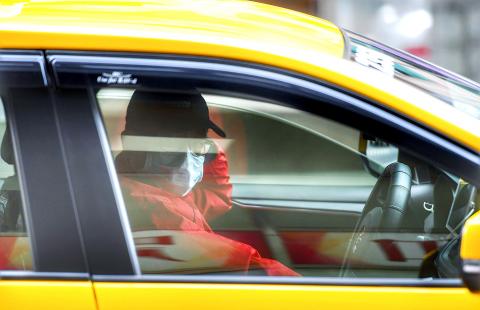Physicians have praised the Central Epidemic Command Center (CECC), saying that its careful screening led to the detection of the first death from COVID-19 in Taiwan.
The center on Sunday announced that the nation’s 19th confirmed case and the first death was a 61-year-old Taiwanese who tested positive for COVID-19 after he had been hospitalized for suspected serious flu complications, including pneumonia.
The man began coughing on Jan. 27 and was hospitalized with difficulty breathing on Feb. 3, but he was not reported as a suspected case at the time because he had not traveled overseas.

Photo: CNA
He died of pneumonia and sepsis on Saturday.
The test for COVID-19 was reported as positive on Saturday. The center had expanded its screening measures on Wednesday to include tracing cases of serious flu complications with pneumonia that had tested negative for flu since Jan. 31.
Among 113 such cases, the man’s was the only one to test positive for COVID-19.
The man’s 51-year-old brother also tested positive for COVID-19, becoming the nation’s 20th confirmed case. He has not experienced symptoms.
“God bless Taiwan,” Tsai Hsien-lung (蔡賢龍), an attending physician at Cheng Hsin General Hospital’s department of emergency medicine, wrote on Facebook on Sunday.
“Although shocked [at the result], I am moved by how the 19th case was found by tracing and exhaustive screening,” Tsai wrote.
“The 20th case was also found through the careful procedure,” he wrote.
“Thank God someone launched the screening procedure and tested the additional cases,” he wrote.
Tan Che-kim (陳志金), a physician at Chi Mei Foundation Medical Center, wrote on Facebook that the 19th case was found because the center took the initiative to expand its screening measures, which Tan said was a job well done.
As there is the possibility of local transmission, people should take protective measures, such as avoiding unnecessary visits to crowded places and hospitals, washing their hands frequently and paying attention to the center’s advice on when to wear a mask, the CECC said.
Former Democratic Progressive Party legislator Lin Ching-yi (林靜儀), an obstetrician and gynecologist, praised the center on Facebook.
“It is really impressive how the CECC traced cases and tested for COVID-19 in scenarios that did not match the criteria for mandatory report at the time of diagnosis,” Lin wrote. “The infected patients and people who had close contact with them would not have been found if it had not acted.”
“I truly believe the performance of Taiwan’s CECC so far must be the best in the world,” she wrote.
Centers for Disease Control Deputy Director-General Chuang Jen-hsiang (莊人祥) said that the CECC noticed that Singapore and the US had expanded their testing to include more suspected cases, and one confirmed death in Japan did not have travel or exposure history.
Based on these observations, the CECC traced and screened the 113 cases, Chuang said.

Alain Robert, known as the "French Spider-Man," praised Alex Honnold as exceptionally well-prepared after the US climber completed a free solo ascent of Taipei 101 yesterday. Robert said Honnold's ascent of the 508m-tall skyscraper in just more than one-and-a-half hours without using safety ropes or equipment was a remarkable achievement. "This is my life," he said in an interview conducted in French, adding that he liked the feeling of being "on the edge of danger." The 63-year-old Frenchman climbed Taipei 101 using ropes in December 2004, taking about four hours to reach the top. On a one-to-10 scale of difficulty, Robert said Taipei 101

Nipah virus infection is to be officially listed as a category 5 notifiable infectious disease in Taiwan in March, while clinical treatment guidelines are being formulated, the Centers for Disease Control (CDC) said yesterday. With Nipah infections being reported in other countries and considering its relatively high fatality rate, the centers on Jan. 16 announced that it would be listed as a notifiable infectious disease to bolster the nation’s systematic early warning system and increase public awareness, the CDC said. Bangladesh reported four fatal cases last year in separate districts, with three linked to raw date palm sap consumption, CDC Epidemic Intelligence

US climber Alex Honnold left Taiwan this morning a day after completing a free-solo ascent of Taipei 101, a feat that drew cheers from onlookers and gained widespread international attention. Honnold yesterday scaled the 101-story skyscraper without a rope or safety harness. The climb — the highest urban free-solo ascent ever attempted — took just more than 90 minutes and was streamed live on Netflix. It was covered by major international news outlets including CNN, the New York Times, the Guardian and the Wall Street Journal. As Honnold prepared to leave Taiwan today, he attracted a crowd when he and his wife, Sanni,

Taiwanese and US defense groups are collaborating to introduce deployable, semi-autonomous manufacturing systems for drones and components in a boost to the nation’s supply chain resilience. Taiwan’s G-Tech Optroelectronics Corp subsidiary GTOC and the US’ Aerkomm Inc on Friday announced an agreement with fellow US-based Firestorm Lab to adopt the latter’s xCell, a technology featuring 3D printers fitted in 6.1m container units. The systems enable aerial platforms and parts to be produced in high volumes from dispersed nodes capable of rapid redeployment, to minimize the risk of enemy strikes and to meet field requirements, they said. Firestorm chief technology officer Ian Muceus said